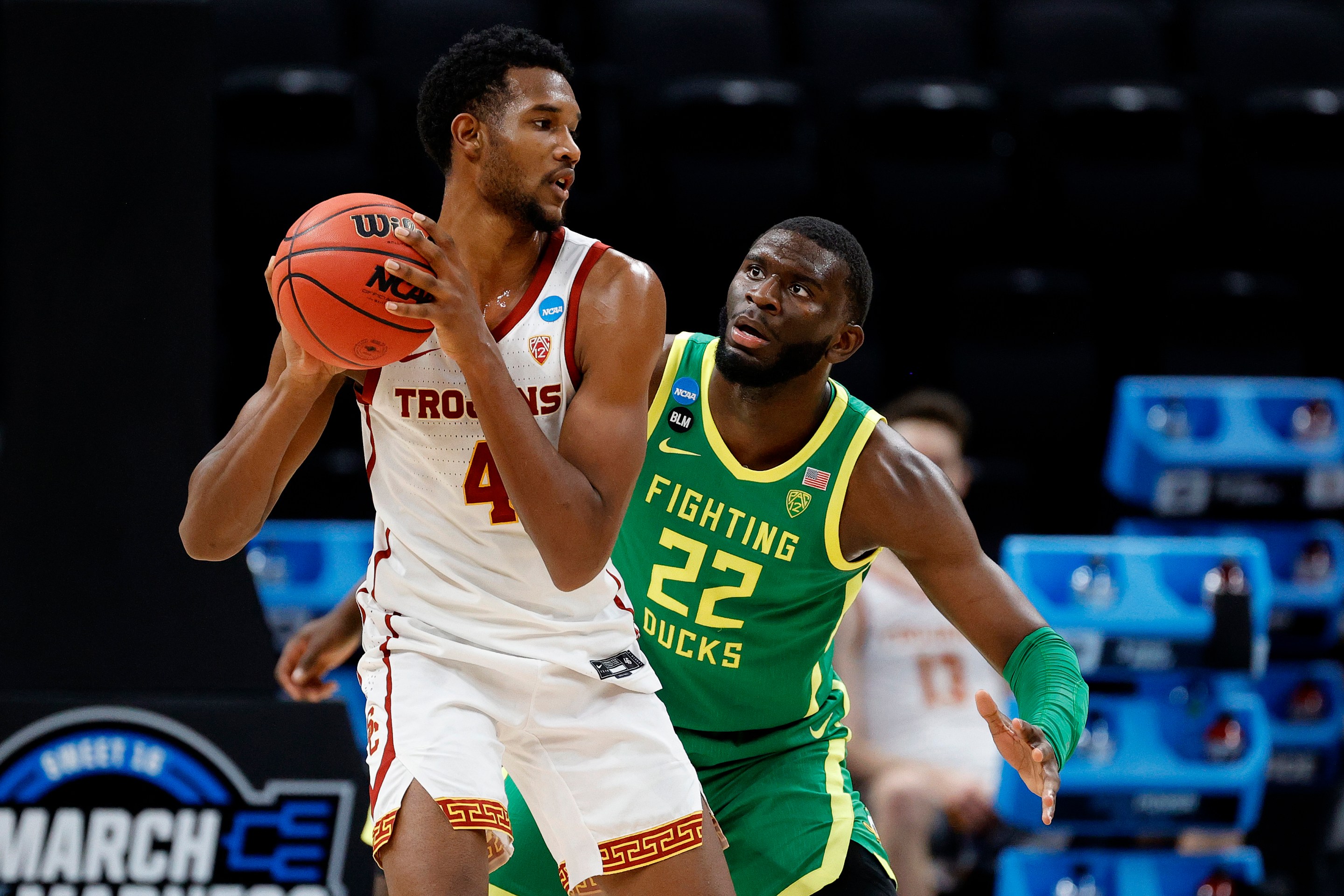Evan Mobley, chosen third overall in last week's NBA draft by the Cleveland Cavaliers, "has the floor to at least be an important player who impacts winning." Scottie Barnes, drafted next by the Toronto Raptors, likewise "impacts winning"; he also "impacts defense"; he has "a hard-to-quantify but undeniable impact on winning."
They're not alone in this. Zion Williamson's "ability to impact winning already portends future greatness"; it's good to impact winning. I don't know what it portends for Jae'Sean Tate of the Houston Rockets that he somehow "impacts winning" on by far the worst team in the NBA, but he definitely "impacts winning." Chuma Okeke, whose Orlando Magic posted a 15-31 record with him in the lineup last season, also "impacts winning."
Kosta Koufos, by contrast, does not "impact winning in a significant way." Russell Westbrook could "impact winning even without racking up points," but only if he were more willing to do other stuff. (Westbrook might dispute this. According to him, "I take a lot of pride in doing everything that impacts winning, as much as I can leave it on the floor.") John Collins "came into this season facing questions about how much his impressive production could actually impact winning"—"he can put up big counting stats in Atlanta ... even if they don’t impact winning." New York's Julius Randle, meanwhile, has proven that he can produce "in a way that meaningfully impacts winning." Luka Doncic will attract more fellow stars to Dallas, "the more he impacts winning."
Those are all just from basketblogs on The Ringer. And no wonder! When it comes to making picks at the top of the NBA draft lottery, Kevin O'Connor, basketball writer for the site, wants "players who impact winning in a big way in the playoffs," and he will not settle for less. Basketball scouting, after all, in his estimation "is about finding the players who impact winning." If this is mostly a Ringer peculiarity, it's not only that. For example Duncan Robinson, according to a blog called Five Reasons Sports Network, is not just a great three-point shooter—"he's a guy that impacts winning." Jimmy Butler, according to NBC Sports's Dan Feldman in what may be the most tortured conceivable sequence of four English-language words, "immensely positively impacts winning." When the win impacting is not only positive but also immense (or positive in an immense type of way), you've really got something special.
This formulation—"impacts winning"—seems to be a loan from coach- and/or scout-speak. Miami Heat coach Erik Spoelstra shares Feldman's sentiment regarding Butler, if not in quite as florid gobbledygook (emphasis added):
“He is an elite competitor. He is a great basketball player. It’s attached to how he impacts winning, not to this modern-day definition of three-point percentage or three-and-D or all these little terms you hear.
“He’s a throwback. It’s about how he impacts winning, how he impacts your team, your locker room, your culture, your franchise. He does that in a remarkable way.”
Toronto Star
Hassan Whiteside, by contrast, was only just "learning how to impact winning" back in 2016, according to Spoelstra. (The lessons didn't stick, I guess.)
Golden State Warriors head coach Steve Kerr "maintain[s] that Draymond [Green] impacts winning at a level other players can only dream about":
"Nobody impacts winning more than LeBron James," according to James's Lakers coach, Frank Vogel. In that case maybe Bradley Beal doesn't impact winning more than James, but former Washington Wizards coach Scott Brooks thinks he "impacts winning as well as anybody in the league." That's nothing to sniff at!
Way back in 2015, Boston Celtics then-coach, now-team president Brad Stevens had this to say about rookie Marcus Smart (emphasis added):
“My biggest thing about Marcus is not what he does statistically, it’s how he impacts winning. Sometimes those two things go hand in hand, sometimes they don’t with what he does. I don’t know if he’ll have a ‘breakout year’ from a perception standpoint, but I know that guy impacts winning and so he’ll play a big role for us.”
Providence Journal
Fringe guard Abdel Nader, then with the Oklahoma City Thunder, got Stevens's benediction, too, back in 2020: "He's a guy that you could put in the game and impact winning because he can shoot it, he can drive it. And then he's a long, athletic guy that cares, and that usually adds up to a pretty good defender as well." Presumably Nader impacts winning somewhat less, uh, impactfully (?) than Smart: He spent big chunks of his lone Celtics season kicked down to the G League, and then got traded for some guy named Rodney Purvis, and averages 13 minutes per game over his four-year professional career. Or maybe he impacts winning immensely negatively.
Jalen Brunson, according to his former Team USA coach Billy Donovan, "understands very, very clearly what goes into winning, and he impacts winning." Imagine understanding very, very clearly what goes into winning, and then not impacting winning. What kind of a shitty loser would do that?
Ricky Rubio, for his part, "impacts winning in a way where he can help young players grow," according to his former coach with the Minnesota Timberwolves, Ryan Saunders. (I suppose it's good that Rubio can impact winning in that way, at least; the Wolves went 23-45 with him in the lineup last season.) Former University of Michigan guard Zavier Simpson, according to Ohio State University head coach Chris Holtmann, "deserves a lot of credit for how he impacts winning. I think he just really impacts winning in a lot of ways, and he deserves a lot of credit for that." And here's Iowa State University head women's basketball coach Bill Fennelly way back in 2005, on point guard Lyndsey Medders (emphasis added):
"She's Tom Brady-like—maybe not the flashiest or quickest thing in the world, but ultimately you want someone that impacts winning, and she impacts winning. She did it last year and now she's doing it with this team this year."
Newspapers.com
This is the gold standard for a point guard, to be likened to an all-time win-impacter like Tom Brady. Who impacts more wins, or impacts wins of greater immensity, or impacts immense wins more immensely positively, than Tom freaking Brady? Nobody.
I suppose the first question to ask about all of this is "What the fuck does 'impacts winning' mean?" Strictly speaking, like just in terms of the meaning of words, and how their meanings can modify each other when you link them together, "impacts winning" means next to nothing—and not only because "impact," as a verb, may well be the single most worthless word in all the English language. If you take "impact" to mean "have an effect on," then just about everything that happens on a basketball court during a basketball game in one way or another impacts winning. Ben Simmons passing up a wide-open, point-blank dunk while trailing narrowly in the closing minutes of an elimination game because he's pathologically afraid of trying to score sure as hell impacts winning; you could even say it does so immensely. Ben Simmons impacts the shit out of winning!
In that sense, though, a basketball player needn't learn how to impact winning, as Spoelstra praised Whiteside for working to do; nor would you praise a basketball player by saying that they impact winning. If impacting winning—again, just going by what words mean—were praiseworthy in and of itself, you'd rather have a cataclysmically inept basketball player on the floor than a league-average one: The clueless doofus will go minus-50 and impact winning like a bunker-buster bomb, while the league-average player might just kind of disappear into the action and come out with a net rating of zero. Somehow I do not think this is the relationship to basketball Brad Stevens is trying to describe when he says that Marcus Smart impacts winning.
I'm aware this argument is pedantic. As it applies to coaches, it might also be unfair. After all, these are people whose jobs are to coach basketball players and teams, not to describe them in particularly illuminating ways; moreover, when they do speak about their players and teams, they're expected to be positive and complimentary and to reinforce the attributes and habits they want to see from their players. In their case it's broadly fine to apply the "Oh, lighten up, you know what they mean" standard to a dipshit phrase like "impacts winning."
Except ... what do they mean by it? Pulling in context from the above instances, "impacts winning" seems in most cases to be about competing avidly and unselfishly in areas—defense, passing, "the little things"-type shit—that facilitate victory even if the effort doesn't yield impressive individual numbers. It seems meant to contrast merely putting up empty but impressive-looking stats with the more honorable work of playing winning basketball—another hazy phrase that mostly sails cleanly over the "you know what they mean by it" standard when it comes out of a coach's mouth. (There's a whole other miserable last-decade debate to rehash, I suppose, over the idea of empty stat-getting and just how neat the binary really is between that and the less glamorous basketball stuff supposedly more conducive to success, but you won't get that in this damn blog if I have anything to say about it.)
The utility of this to a coach, or a scout, seems pretty clear. It is, or can be, a reasonably quick, if goofy and inelegant, way of crediting the basketball virtues (competitiveness, unselfishness, constancy, effort) seen as un-glamorous but beneficial to a team's objectives, and the players who embody them. No small portion of a coach's job is to convince players to embrace parts of the game they might otherwise be inclined to ignore; a scout's entire job is evaluating the abilities and capacities of potential players. If "impacts winning" is instrumental to those purposes, then it has value to those jobs even if it illuminates nothing at all to anybody outside of them.
Then again, neither LeBron James nor Bradley Beal has played consistently worth-a-damn defense across even one whole regular-season game in years, not from lack of ability but from persistent, undisguised lack of effort or interest. Yet I think no sane coach or scout with even the tiniest instinct for professional self-preservation would dare argue against the assertion that James, in particular, is as personally conducive to winning as virtually any other player, ever. "Impacts winning" seems to mean something different in his case—and certainly in that of Beal, whose broad profile fits the "empty stats on a bad team" stereotype better than anybody else in the NBA—from what it means in, say, Marcus Smart's. And if Abdel Nader's, uh, caring-plus-length helps him impact winning in Brad Stevens's eyes, it's maybe worth noting that in Boston Stevens coached both Nader and Isaiah Thomas, one of the tiniest players and worst defenders in the entire history of the NBA; he gave the former a hair under 11 minutes of playing time per game, and built an Eastern Conference finalist around the latter.
This, I hope, gets at what's so spectacularly derelict and pathetic about professional basketball writers using the term "impacts winning" to describe players. The whole value proposition of reading actual basketball writing by professional writers, rather than scouting reports prepared by professional scouts or raw press availability transcripts, is that it is in language comprehensible outside the weird insular professional bubble where coaches and professional scouts and ballplayers talk to each other—that it can clarify or break down or interrogate where necessary what's said and implicitly understood in there. Judge what a coach says on the basis of whether it helps the team and its players thrive and succeed; judge what a scout says on the basis of whether it helps the team acquire good players; judge what a basketball writer writes on the basis of whether it illuminates any goddamn thing about basketball.
It's great to know that Scottie Barnes "impacts winning"! This is informative: It lets you know that Barnes projects to be a player like Zion Williamson (one of the most extraordinary young players in memory, a future superstar, astoundingly productive, "impacts winning") or Jae'Sean Tate (a role player on the worst team in the NBA, "impacts winning") or Abdel Nader (a 27-year-old unrestricted free-agent who likely will play most of the rest of his career overseas, "impacts winning"). That is to say, it illuminates absolutely nothing about him.
Worse, "impacts winning" isn't even intended to illuminate anything about Barnes, or Williamson, or LeBron James, or any other basketball player. At best—at best!—its purpose is to cut the reader in on a shabby fantasy role-play of industry-insider talk; you get nothing out of it save the deeply sad, creepy, illusory thrill of inhabiting a character who can wrap up a set of personal preferences and value judgments into a bullshit phrase like "impacts winning," slap it on a hyper-talented 19-year-old celebrity, and shape their life prospects with it. At worst, its purpose is to fortify and magnify a gulf between reader and writer—so that you will come away from reading the NBA draft guide or whatever definitely not more informed about the topic, but more convinced of Kevin O'Connor's access, expertise, and authority, relative to yours. It's a flimsy stand-in for all the actual knowledge you might imagine implied by familiarity with the jargon. This phenomenon is perhaps not such a distant cousin to the similarly baffling ways that various NBA insiders have gone about torturing the English language while conveying their precious scoops. Both serve to turn the act of writing about basketball into something akin to industry reporting, and in the process grant the writer with a cheap aura of insider expertise. It's like rent-seeking, but for basketbloggers.
Because here is the thing: The objective of a basketball team, within a game of basketball, is to win that game. That's the whole shit. Whatever constellation of discrete abilities and skills and personal qualities a given player has, if the addition of that player could be expected to improve the prospects of an in all other respects perfectly average team, then the simplest perfectly accurate way to encapsulate this fact is to say that the player is good. That's pithier and more succinct than "impacts winning" and ultimately no less precise. In fact it's exactly what "impacts winning" is trying to obscure behind implied but never specified coach morality. The reason to say a player "impacts winning" rather than saying that player is good is to pretend a level of aficionado discernment that would enable you alone to perceive truths shocking to the duller minds of your readers: Sure, yes, this guy can score 40 points in a game you win by scoring more points than the other team, but he does not Impact Winning, unlike the T-rex-armed doofus who nobly drew a charge in his 14 seconds of playing time. Actually, you fool, you absolute oaf, it is Luka Doncic who could stand to be more like Chuma Okeke, and not the other way around, and you will just have to take my word for it.
Which is to say, it's bullshit. Cut it out!






